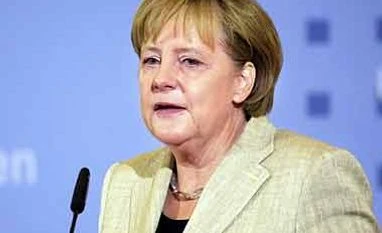German Chancellor Angela Merkel has hailed progress in helping Turkey deal with the refugee crisis and vowed to push forward its long-stalled EU membership bid, as Slovenia warned it would have to slow a rising influx of migrants.
Merkel held talks in Istanbul with Prime Minister Ahmet Davutoglu and President Recep Tayyip Erdogan on a critical one-day visit, which came with Germany reeling from a bloody knife attack on a pro-refugee politician.
The European Union wants Turkey to do more to tighten its border security and help contain the historic influx of Syrians and others escaping conflict, persecution and poverty.
Merkel and the Turkish leadership indicated that officials were making progress towards a deal on cooperation, although neither suggested a final agreement had been reached.
The German chancellor said that Berlin was prepared to support opening Chapter 17 of the EU accession process -- which deals with economic and monetary affairs -- and consider opening more of the 35 policy chapters.
Speaking after her talks with Erdogan yesterday, Merkel said the EU and Turkey were in agreement to work closer "on dynamising the accession process" towards Turkey's EU membership and also visa liberalisation for Turks wanting to travel to the EU's Schengen zone.
"The talks in that direction are very promising and will be continued," said Merkel, sitting on a large golden chair alongside Turkish strongman Erdogan.
Erdogan, who for months has bitterly criticised the EU's attitude towards Turkey, said he was also calling for more accession chapters to be opened.
Davutoglu praised a "better approach" from the European Union on dealing with the over two million people who fled Syria's civil war for Turkey.
"Unfortunately Turkey was left alone by the international community in terms of burden sharing."
"We are very pleased there is a better approach now," said Davutoglu.
Germany has been Europe's top destination for refugees, most of whom travel through Turkey and the Balkans, and is expecting to register up to a million asylum requests this year.
Merkel said that the fact Turkey had accomplished the immense task of looking after over two million Syrian refugees on relatively little funding had led to a "migration pressure" which resulted in the current unprecedented influx of migrants into Europe.
"Turkey had little international help until now for the huge contribution it has made," said Merkel.
She said it was in the interests of neither side that this resulted in illegal migration into the EU.
"This cannot be the aim. We will engage ourselves more strongly financially as the European Union. Germany will play its part," she promised.
Merkel held talks in Istanbul with Prime Minister Ahmet Davutoglu and President Recep Tayyip Erdogan on a critical one-day visit, which came with Germany reeling from a bloody knife attack on a pro-refugee politician.
The European Union wants Turkey to do more to tighten its border security and help contain the historic influx of Syrians and others escaping conflict, persecution and poverty.
More From This Section
In return, Ankara wants greater recognition for its role in hosting over two million Syrian refugees, an increase in financial help and an acceleration of its stuttering drive for EU membership.
Merkel and the Turkish leadership indicated that officials were making progress towards a deal on cooperation, although neither suggested a final agreement had been reached.
The German chancellor said that Berlin was prepared to support opening Chapter 17 of the EU accession process -- which deals with economic and monetary affairs -- and consider opening more of the 35 policy chapters.
Speaking after her talks with Erdogan yesterday, Merkel said the EU and Turkey were in agreement to work closer "on dynamising the accession process" towards Turkey's EU membership and also visa liberalisation for Turks wanting to travel to the EU's Schengen zone.
"The talks in that direction are very promising and will be continued," said Merkel, sitting on a large golden chair alongside Turkish strongman Erdogan.
Erdogan, who for months has bitterly criticised the EU's attitude towards Turkey, said he was also calling for more accession chapters to be opened.
Davutoglu praised a "better approach" from the European Union on dealing with the over two million people who fled Syria's civil war for Turkey.
"Unfortunately Turkey was left alone by the international community in terms of burden sharing."
"We are very pleased there is a better approach now," said Davutoglu.
Germany has been Europe's top destination for refugees, most of whom travel through Turkey and the Balkans, and is expecting to register up to a million asylum requests this year.
Merkel said that the fact Turkey had accomplished the immense task of looking after over two million Syrian refugees on relatively little funding had led to a "migration pressure" which resulted in the current unprecedented influx of migrants into Europe.
"Turkey had little international help until now for the huge contribution it has made," said Merkel.
She said it was in the interests of neither side that this resulted in illegal migration into the EU.
"This cannot be the aim. We will engage ourselves more strongly financially as the European Union. Germany will play its part," she promised.
)